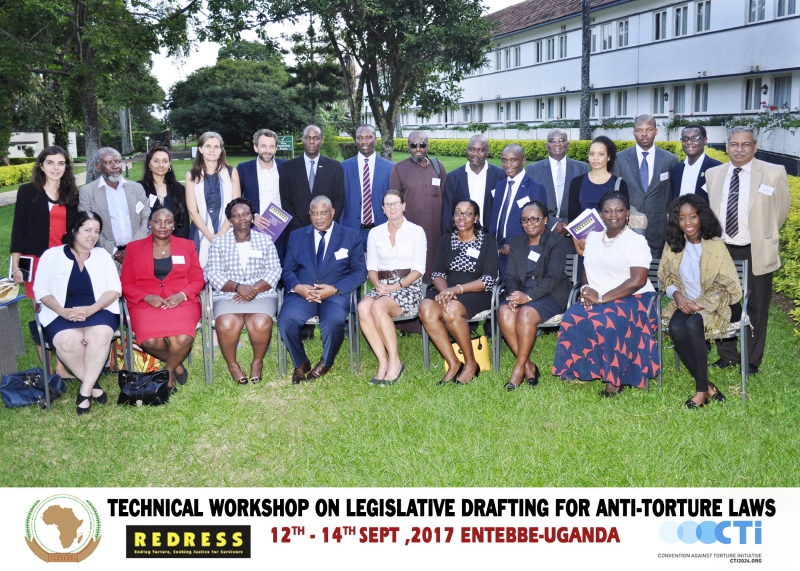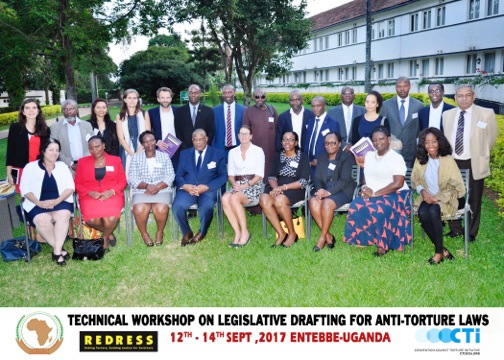
Location
Entebbe, UgandaAttendance
Invitation Only
Date & Time
Start: 12/09/17 00:00
End: 14/09/17 00:00
From 12 to 14 September 2017, the CTI, in partnership with REDRESS and the African Commission on Human and Peoples’ Rights, held its first workshop on legislative drafting for anti-torture laws. The technical workshop, held in Entebbe, Uganda, brought together representatives of 10 African common law countries* as well as […]

From 12 to 14 September 2017, the CTI, in partnership with REDRESS and the African Commission on Human and Peoples’ Rights, held its first workshop on legislative drafting for anti-torture laws. The technical workshop, held in Entebbe, Uganda, brought together representatives of 10 African common law countries* as well as a member of the Indian Law Commission.
Designed as a direct follow-up to the CTI regional seminar on anti-torture laws held in Accra, Ghana in April 2016, the workshop responded to a number of requests for further opportunities to be able to share technical expertise on legislative drafting and international and regional anti-torture frameworks.
Opening the event, Commissioner Med Kaggwa of the African Commission, reminded participants that “the core that unites us is the promotion and protection of human rights, and the elimination of the vice of torture.” REDRESS’ Executive Director, Dr. Carla Ferstman, added that, “Because of the severity and gravity of torture, normal laws are insufficient.”
The meeting covered three main aspects related to anti-torture legislation: the latest legislative drafting principles and techniques, international and regional legal frameworks and jurisprudence, and strategising around how to initiate, gain support for and pass anti-torture legislation.
Ms. Olive Zaale, an experienced Ugandan drafter, exposed participants to the latest practices on legislative drafting and the underlying principles of good legislation: clarity, precision and consistency. Her sessions were complemented by sessions and exercises on anti-torture legislation, informed by the experiences of two State practices: Ms. Purnima Dunputh, a senior legislative drafter in the Office of the Attorney-General of Mauritius, explained the Mauritius’ approach of amending relevant laws to criminalise torture, while Ms. Ruth Ssekindi, Director of Complaints, Investigation and Legal Services at the Uganda Human Rights Commission, took the participants through the structure and process of adopting stand-alone anti-torture legislation. Throughout the workshop, participants had the opportunity to exchange on what would be the most appropriate approach (amendments or stand-alone legislation) for their respective countries, depending on their context, legal traditions and governmental priorities.
A highlight of the workshop was a panel discussion on Uganda’s national law, bringing together different sectors of society that had contributed to the adoption of the Bill in 2012: H.E. Mr Wilfred Niwagaba, Member of the Ugandan Parliament, Mr. Samuel Herbert Nsubuga, Chief Executive Officer of the African Center for Torture Victims, Mr. Paul Okirig, Senior State Attorney at the Ministry of Justice of Uganda, and Ms Ruth Ssekindi, Ugandan Human Rights Commission.
During the closing of the workshop, Dr Alice Edwards, Head of the CTI Secretariat, emphasised the need for enabling legislation, regardless of the final choice as to its form: “Torture and other abuses cause enormous suffering to victims and their families, as well as destroying the trust between governments and their citizens, calling for the prosecution and punishment of perpetrators and remedies for victims.”
For more information on anti-torture legislative approaches, please consult the APT-CTI Guide on anti-torture legislation, available in Arabic, English, French, Portuguese and Spanish..
For more information on legal frameworks to prevent torture in Africa, please consult REDRESS’ report.
* Participants at the workshop included representatives from the Gambia, Ghana, Lesotho, Liberia, Malawi, Seychelles, Sierra Leone and Swaziland, supported by representatives from Mauritius and Uganda sharing their experiences.


